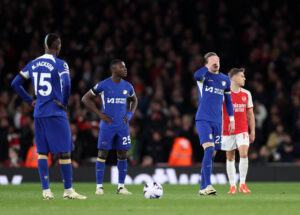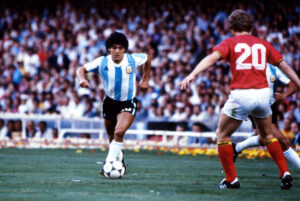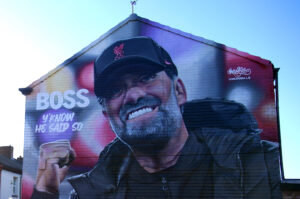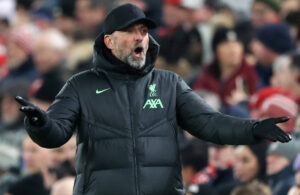Joey Barton leaving Rangers by mutual agreement is almost a bizarre footnote to this weekend’s England-Scotland World Cup qualifier, as the most controversial English player of the last decade ends his brief time in Scottish football.
This latest development in Barton’s extraordinary career also confirms that he is football’s Dr. Jekyll and Mr. Hyde: capable of being charming, witty and erudite off the pitch, but equally capable of turning into an angry, uncontrollable monster on it.
Joey Barton: Football’s Dr. Jekyll and Mr. Hyde
Rangers and Barton have both agreed to terminate his contract with the club, but one wonders just how mutual the agreement really was. Perhaps as “mutual” as Sam Allardyce’s decision to quit as England manager before he was fired.
The agreement to tear up Barton’s contract followed the club’s banning of him after a training ground incident in September. Shortly after he had arrived in Scotland, he allegedly said “inappropriate things” to teammate Andy Halliday.
In a week when Donald Trump has won the White House despite saying virtually nothing other than inappropriate things during the election campaign, that is deeply ironic. Not least because anyone who knows Barton would have predicted that he would say inappropriate things and even behave in an inappropriate manner, given the number of times he has done so in the past.
There have been numerous theories put forward to explain Barton’s failure to stay the course in Scotland. One such theory includes the argument by BBC Scotland’s eminent reporter, Tom English, that he had “wilted under the heat at Ibrox”. An alternative view is that he struggled in Scotland from the start after realising, almost immediately, that he had made the wrong decision in leaving newly-promoted Burnley in order to join Rangers.
He may have thought that he was joining a big, even giant, club that could compete for the Scottish title. But in reality, their first season back in the SPL was always going to be tough for Rangers. Any thought of them seriously challenging Celtic for the title was quickly made to look foolish, not least when Celtic thrashed them 5-1 early in September. That was one of only eight matches that Barton played for Rangers and it may have been the one that finally impressed upon him how big the task of challenging Celtic truly was.
Barton had been extremely impressive for Burnley in the Championship last season, not only playing a vital role in midfield but largely keeping his famous temper under control. Some trouble did arise, such as the incident at Brighton where he was accused of stamping on the home side’s Beram Kayal.
In Sean Dyche, he had perhaps found the perfect manager. Dyche himself had been an enormously tough and combative centre-half who spent most of his career in the Championship, but he had transformed himself into one of the most thoughtful, even cerebral, of managers. In leaving Burnley shortly after they had won the Championship, Barton left a secure environment in which his temper was largely kept in check for an unknown, even insecure setting in Scotland where his worst excesses were always likely to emerge, especially in the context of the fiercely partisan and sectarian rivalry between Glasgow’s two great clubs.
The move to Scotland was always a strange one and it may have been prompted by Barton’s realisation that he perhaps could not longer cut it in the Premier League, if indeed he had ever been able to cut it in England’s top flight. Interviewed last season about his experience in the Championship, he famously said that while others found it a “tough league to get out of”, he himself had had no problems on that front after previously winning promotion with both Newcastle United and Queens Park Rangers.
However, he may also have inadvertently attested to his own true status in the game, as a player good enough for the Championship (even, perhaps too good) but not quite good enough for the Premier League. In that way, he was possibly a “yo-yo” player in the same way that certain clubs are seen as “yo-yo” clubs for alternating between Championship success and Premier League failure.
Barton’s charge sheet is certainly a long one, from his use of a youth team player at Manchester City as an ashtray to his infamous sending-off against City for QPR in the last game of the 2011-12 season, when QPR were still in danger of being relegated. QPR were eventually saved by Bolton’s failure to defeat Stoke City, rather than through their own efforts.
However, that last incident also demonstrated the other side of Barton’s character. After getting into a tangle with several Manchester City players as he left the field, notably Carlos Tevez, he claimed that he was only trying to “even things up” by getting a Manchester City player sent off with him. As he famously said afterwards, in trying to defend his actions, “God loves a trier”. In its combination of sheer chutzpah and self-deprecating wit, it was pure Barton.
Reputation and legacy
The truth is that Barton may not have found his true calling in football as a player. He may have talked about being a manager in the future, but perhaps a better avenue would be as a football writer. He has certainly said more truly memorable things about football than he has had truly memorable games, including his savage summation of the literary efforts of various England internationals after the team’s failure at the 2006 FIFA World Cup: “We got beat in the quarter-finals, I played like s***, here’s my book”.
His own book, the autobiography that was published earlier this year, was no literary masterpiece but it was still refreshingly different from most other footballers’ biographies. This occurred firstly because he wrote it himself, after dispensing with the services of the ghostwriter, Times columnist Matthew Syed, who had been lined up to assist him; and secondly because few footballers (especially English footballers, sadly) would declare their admiration for Morrissey and quote Nietzsche.
He has also been a splendidly witty and urbane pundit, for example on BBC Five Live, with one particularly succinct analysis of Arsene Wenger’s relationship with Jose Mourinho: “Jose’s had him on toast”.
Having now left Rangers, the future for Barton is uncertain. It may be that he will try to regain his place at Burnley, especially now that they are making such a good fist of surviving in the Premier League. Alternatively, he may decide to drop back down to his old stamping ground (no pun intended), the Championship, perhaps at Cardiff with Neil Warnock who he played under at QPR. Whatever happens, at the age of 34 he is definitely nearer the end of his career than the beginning.
When the final accounts are written about Barton’s playing career, it may be evident that his greatest tragedy was that he never played with the kind of wit and invention that he has so often displayed off the pitch. In that sense, he was the great maverick player that never was.
Joey Barton should have been a brilliant attacker, like Tony Currie, Alan Hudson and Frank Worthington in the 1970’s and 1980’s. But in reality he was always primarily a tough, feisty defensive midfielder, who could never quite translate his undoubted footballing intelligence into skilful, stylish play and scoring goals.
Main Photo:






